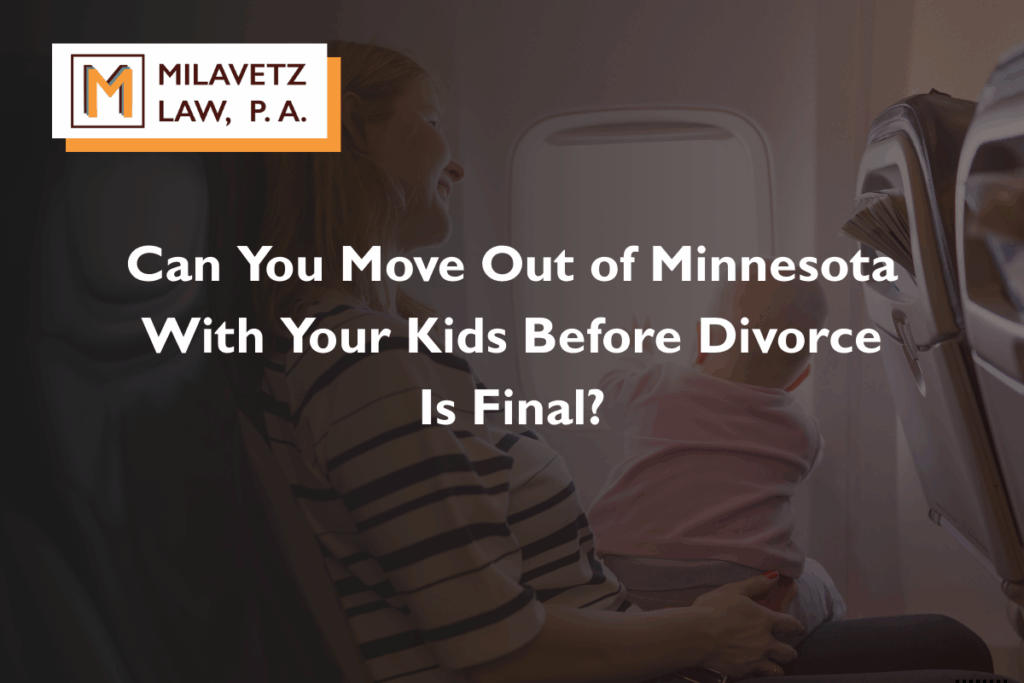
If you’re undergoing a divorce, you may wonder if you can move out of Minnesota with your kids before the divorce is final. There isn’t a simple answer because the ability of a spouse to move out of state with their child depends on several factors. Contact the experienced family law attorneys at Milavetz Law, for a free consultation on relocating a child outside the state.
Navigating the complexities of co-parenting is challenging when both parties live in the same state, let alone when you need to relocate to another state. Moving away with children isn’t always easy, but sometimes it’s in your and your children’s best interests.
In Minnesota, your ability to relocate out of state with your child depends on many factors that complicate the situation. The experienced Minneapolis divorce attorneys at Milavetz Law, will determine if your case meets the requirements and guide you through the process.
Understanding Minnesota Parenting Plans
Whenever divorce proceedings involve a minor child, the couple must devise a parenting plan under Minnesota Statutes § 518.1705, Subdivision 2, that covers how custody will be divided.
A parenting plan establishes the following:
- A schedule outlining the frequency of parenting time, the duration of visits, and time spent with parents during holidays and vacations
- A breakdown of decision-making responsibilities for the child, including educational decisions
- Guidelines for dispute resolution between the parties
Parenting plans are devised in place of a court order for child custody. A court will uphold the agreement unless it determines the plan is not in the child’s best interest. If the couple cannot agree on a parenting plan, the court will impose a plan.
Parents can amend these plans if necessary, although modifications are subject to time limits to protect children and parents from excessive challenges.
Minnesota Statutes § 518.175, Subdivision 1, entitles parents to at least 25 percent of parenting time unless evidence proves it’s not in the child’s best interests. Overnight stays usually determine the parenting time percentage, but if there isn’t any, significant periods on separate days may also be used to calculate the time.
A court can restrict one parent’s time with the child below the 25 percent threshold if it would endanger the child’s physical or emotional health or impair their emotional development. Failure to pay child support is not a factor in restricting parenting time.
Sometimes, a court may determine time with the parent is harmful to a child, such as in cases involving neglect, domestic violence, substance abuse, or conviction of a violent crime. If the court makes such a determination, it may do the following:
- Restrict parenting time below 25 percent
- Restrict the place where the parent can have parenting time
- Restrict the duration of parenting time
- Require supervised parenting time
- Deny parenting time completely
Minnesota Statutes on Moving Out of State
Minnesota Statutes § 518.175, Subdivision 3, specifies that a parent cannot move a child out of state without one of the following:
- A court order permitting them to move
- Written consent from another parent with established parenting time
However, if the parent who wishes to relocate has 100 percent of parenting time, they do not need written consent from the other parent and may move without a court order.
Let’s consider the two hypothetical situations below:
- Suzanne wants to relocate with her child to New York to be near her sick mother. She has 50 percent parenting time. To proceed with the move, she would need permission from the child’s father, Todd, who is remaining in Minnesota. If Todd opposes the relocation, Suzanne must petition the court for an order allowing the move. The court would determine if moving the child to New York is in the child’s best interest.
- Tyler wants to relocate with his two children to Texas for a job opportunity. He has 100 percent parenting time, while the children’s mother, Serena, has none. Tyler can relocate with the children even if Serena disagrees with the move.
Proving the Move Is in the Child's Best Interest
Research proves that maintaining relationships with both parents is in a child’s best interest, except in instances of domestic abuse or other dangerous situations. As such, it can be tough to convince a court that relocating out of state is best for the child.
Generally, the burden of proof, or the legal standard of proving a claim is true, is on the parent seeking to relocate. They must present evidence that relocating is in the child’s best interest. Using our previous example, Suzanne would need to prove to the court that the move to New York is in the child’s best interest.
The exception is when the parent requesting the relocation is a victim of domestic abuse by the non-relocating parent. In that instance, the non-relocating parent bears the burden of proof and must demonstrate it is in the child’s best interest not to relocate. If Suzanne experienced domestic abuse from Todd, Todd must prove to the court that it is in the child’s best interest to stay in Minnesota.
Minnesota Statutes § 518.175, Subdivision3, establishes that the court must apply the best interest standard to such cases. The court will consider the following factors:
- The child’s relationships with the relocating parent, the non-relocating parent, any siblings, and other significant people in the child’s life, such as grandparents
- The child’s age and needs
- The expected impact of the relocation on the child’s physical, educational, and emotional development
- Whether the parents have the financial and logistical ability to preserve the relationship between the child and the non-relocating parent
- The child’s preference—based on the child’s age and maturity
- Whether the relocating parent has a history of promoting or damaging the relationship between the child and the non-relocating parent
- The extent to which the relocation will improve the financial, emotional, or educational quality of life of the relocating parent and child
- The reasons provided by both parents for relocation and opposing the relocation
- How the relocation will impact the child’s safety and welfare
The best interest standard can make relocating with a child difficult if the other parent with parenting time disagrees. A child custody lawyer will help you make the best case for your relocation.
Reasons a Judge May Deny Relocation for Parents Moving Out of State
A judge may deny a parent’s request to relocate with a child for several reasons, including the following:
- The parent did not follow Minnesota’s procedure for relocation. For example, they did not contact the non-relocating parent for permission before moving.
- Your divorce or separation is recent, and you didn’t raise a relocation request as part of those proceedings.
- Relocating would negatively impact the child’s life somehow.
- You are relocating for self-serving reasons, such as to move to a state with higher child support requirements.
- You are relocating to punish the other parent by denying them time with their children.
- The relocation will damage the child’s relationship with the other parent, such as when you and the non-relocating parent don’t have the financial means to ensure the child gets to see the non-relocating parent.
- You have a history of being a difficult or uncooperative co-parent.
Do not attempt to relocate children without the permission of the non-relocating parent or a court order. Minnesota law prohibits intentionally depriving another custodial parent of rights, and taking a child out of state could be considered parental kidnapping. Doing so may prompt felony charges, imprisonment, and fines.
Build Your Case for Relocation With the Help of an Attorney
The family law attorneys at Milavetz Law, have supported divorcing parents for nearly 60 years. We understand that custody battle proceedings and co-parenting are never easy, especially if the parties are in different states.
If you are a divorcing parent planning a move to another state, or your spouse is planning to move, we can help. We can protect your parenting rights and ensure both sides comply with the law. Our caring team of attorneys understands how sensitive and challenging these issues are for your family. We will work to keep things civil and take the stress out of the process.
Schedule a free consultation with child custody attorneys at Milavetz Injury Law today. They are standing by to provide legal help with relocation out of state with a child.














